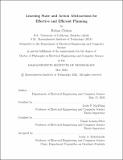Learning State and Action Abstractions for Effective and Efficient Planning
Author(s)
Chitnis, Rohan
DownloadThesis PDF (14.43Mb)
Advisor
Kaelbling, Leslie P.
Lozano-Pérez, Tomás
Terms of use
Metadata
Show full item recordAbstract
An autonomous agent should make good decisions quickly. These two considerations --- effectiveness and efficiency --- are especially important, and often competing, when an agent plans to make decisions sequentially in long-horizon tasks. Unfortunately, planning directly in the state and action spaces of a task is intractable for many tasks of interest. Abstractions offer a mechanism for overcoming this intractability, allowing the agent to reason at a higher level about the most salient aspects of a task. In this thesis, we develop novel frameworks for learning state and action abstractions that are optimized for both effective and efficient planning. Most generally, state and action abstractions are arbitrary transformations of the state and action spaces of the given planning problem; we focus on task-specific abstractions that leverage the structure of a given task (or family of tasks) to make planning efficient. Throughout the chapters, we show how to learn neuro-symbolic abstractions for bilevel planning; present a method for learning to generate context-specific abstractions of Markov decision processes; formalize and give a tractable algorithm for reasoning efficiently about relevant exogenous processes in a Markov decision process; and introduce a powerful and general mechanism for planning in large problem instances containing many objects. We demonstrate across both classical and robotics planning tasks, using a wide variety of planners, that the methods we present optimize a tradeoff between planning effectively and planning efficiently.
Date issued
2022-05Department
Massachusetts Institute of Technology. Department of Electrical Engineering and Computer SciencePublisher
Massachusetts Institute of Technology